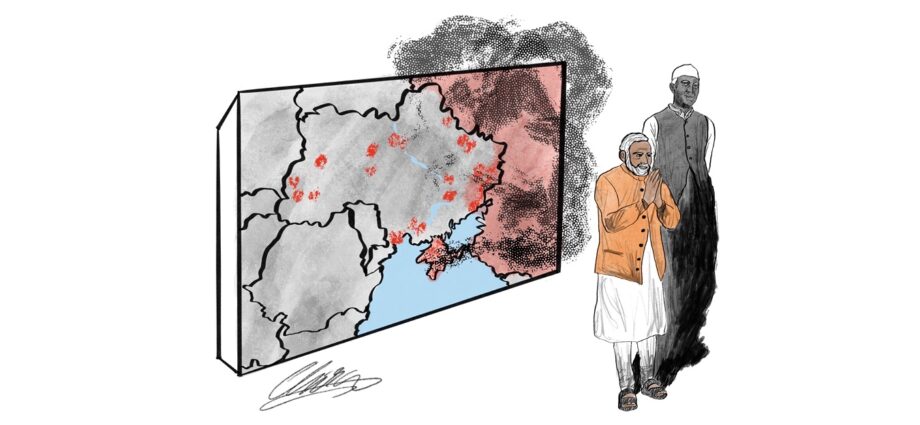By Ayān Sule
The current Indian ruling party and its minions love to berate the Nehruvian intellectual paradigm in their naivete, whilst being simultaneously oblivious to the fact that the ruling party still operates within the Nehruvian paradigm. From Non-Alignment to secularism, and everything in between, the Union Government still wears the veil of the Nehruvian Consensus on the stage of the international political theater. While the Indian right wing loves to critique proponents of secularism for being too “libru” (derogatory for liberal), Minister of External Affairs S. Jaishankar loves to remind the world that India is a society of tolerance and secularism in spite of its cultural and religious diversity. Last Thursday, when Russian troops marched into Ukraine with their tanks, guns, fighter jets, and warships to engage in “peacekeeping”, the Ministry of External Affairs’ rhetorical hypocrisy in their supposed revile of Nehruvianism was rather evident. While countries were implementing decisive sanctions operations, unified condemnations and strong rhetorical posturing, India’s entire foreign policy apparatus was caught with their pants down.
Whatever perspective you choose to look at this kerfuffle, Russia is in clear violation of international law and humanitarian norms. Yet, India chooses to undertake the path of appeasement, which cost the allied nations lasting peace pre-WW2. India has meandered in its reaction, by failing to condemn Russia’s actions, or even avoiding referring to the flagrant violation of international law in the statements released by various mouthpieces of the Union Government yesterday. Pretty on brand for a country that frequently commits extra-judicial killings in Kashmir and justifies the killings of innocents in the Northeast with a law created 50 years ago. India’s neutrality in this time of moral crisis is a stain on India’s reputation, and the supposedly democratic ideals that the country stands for.
Despite rejecting Nehruvianism, the Union Government has decided to take it to its extreme and take an informed decision to not hold Russia accountable for their actions. In their statements, the Union Government acknowledged that an attack had taken place on Ukraine but failed to exhibit any semblance of acknowledgement that it was Russian troops undertaking the attack (see: Indian Ambassador to Ukraine’s Press Release). The Nehruvian principle of Non-Alignment was intended to create a foreign policy doctrine in the Cold War era where a nation would be enabled to take independent foreign policy decisions without having to pledge allegiance to any of the warring superpowers. However, this doctrine comes with a caveat from Nehru himself:
Unsurprisingly, the Union Government has failed to understand the Non-Alignment doctrine, completely rejecting the intricacies of the principle.
Yesterday, the complete lack of intellectual depth concerning India’s Non-Alignment doctrine was rather evident at the United Nations Security Council (UNSC) meeting where India abstained from voting on a resolution that would condemn Russian aggression. The rationale provided by the Indian Ambassador to the UNSC was as follows:
Condemning Russia for their flagrant violation of international law does not imply an abandonment of diplomacy. Rather, condemnation is a form of diplomatic, non-violent protest against a violator of ethical norms. India must understand that their lack of decisive repercussions against Russia indicates that Russia can violate international law whilst India, a major power, will idly stand by. India’s neutrality can be explained by the strong historical trade ties during the times of the Soviet Union. However, this trade has tapered off, with Russia not even making it to the list of India’s top 20 trading partners. Additionally, with China’s transgressions into the Indian border, which was condemned by the United States and not Russia, it is clear that Russia’s priorities lie elsewhere. If a hypothetical war were to break out with China, it would be the US supporting India and not Russia. Hence, India’s entire foreign policy doctrine needs to be re-evaluated.
Not only will this path of appeasement lead India down a path of a tarnished moral reputation, but also a long-term repudiation of India from the international community. When Pakistan and China- India’s geopolitical foes- have been more historically inclined to favor Russia, it is evident that India’s foreign policy is in dire need of a revision. Does India really want to go down in history as the country that said nothing while Russia disturbed peace through irrational belligerence? Or do we want to go down in history as the major power that undertook the tough, virtuous, and ethical decision of standing against a violator of human rights despite strong historical trade ties?
Unfortunately, these questions will stand the test of time. Until then, we can sit tight and watch a belligerent nation encroach the sovereignty of a free country and say nothing – just like the Government of India.
Edited by Uilson Jones and Teun van Dieten, artwork by Chira Tudoran

